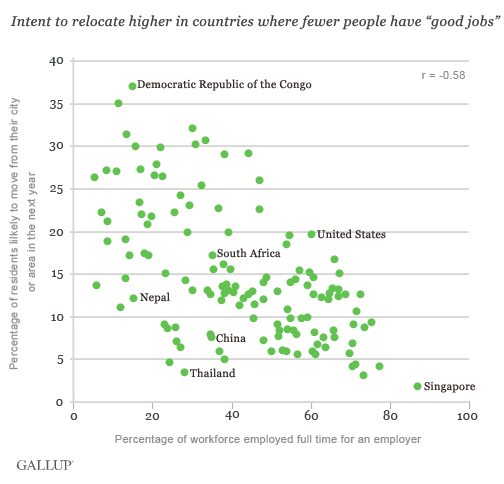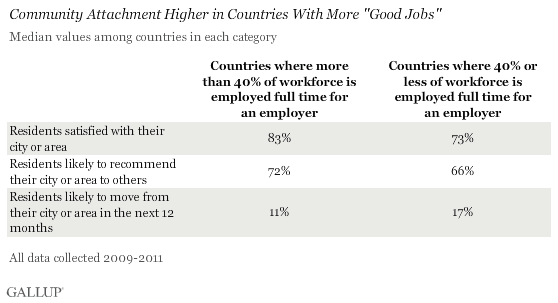WASHINGTON, D.C. -- Gallup's worldwide research documents a clear relationship between "good jobs" and community attachment. In countries where more people in the workforce are employed full time for employers, residents are more likely to be satisfied with the communities they live in, more likely to recommend them to others, and considerably less likely to say they will probably leave them in the next year.

Each point in the scatterplot graph represents one of 134 countries where Gallup asked residents about their employment status, as well as a series of questions that gauge their level of attachment to the place they live. The downward-sloping pattern indicates that as the percentage of those in the workforce who say they are employed full time for an employer increases, the proportion of all residents who say they're likely to move away from their city or area tends to decrease. Simply put, where more full-time employment exists, people are more rooted to their communities.
Gallup has found worldwide that people who work full time for an employer -- have good jobs -- rate their overall lives better than any others in the workforce. In no country where a relatively high proportion of people have good jobs is there also a high proportion who say they are likely to leave their communities.
However, there are some countries where few workers are employed full time for employers, and where residents are unlikely to leave their communities. Several of these have isolated populations, including the African island nation of Madagascar and Nepal in the Himalayas. In such places, residents may be unable to relocate even if they'd like to.
Good Jobs, Stable Communities
Among the indexes Gallup tracks worldwide, community attachment is the most strongly related to good jobs -- but both are vital to building a society that fosters well-being and productivity. Still, the relationship between them doesn't necessarily mean that one variable causes another. Other factors may affect each of them. For example, chronic conflict like that in the Democratic Republic of the Congo affects employment opportunities and the quality of community life. And in all countries, per-capita GDP and other traditional economic indicators influence employment and community attachment. However, the relationship between the prevalence of full-time jobs and residents' intent to leave their communities remains strong even after taking per-capita GDP into account.
Even among countries where residents have similar living standards, the ones with more good jobs also tend to have greater community attachment. Among countries where more than 40% of the workforce is employed full time for an employer, a median of 11% of residents say they're likely to leave their communities in the next year, versus 17% in countries where fewer workers have this employment status. The median percentages of residents who are satisfied with their communities and who would recommend them to others are also higher in countries where more workers have these good jobs.

Implications
The strength of the link between good jobs and community attachment highlights how important job creation is to the future of communities and entire societies. Worldwide, cities where full-time employment for employers is stagnant or declining risk being hollowed out as they fail to provide residents with the hope and purpose that comes with a good job.
Cities that have figured out how to establish favorable conditions for job creation, on the other hand, are likely to reap the benefits. Gallup's data suggest they are more likely to retain the talents and energy of their existing populations as well as attract talented workers and entrepreneurs who have left other communities with fewer jobs. These cities are most likely to thrive as the global economy regains its footing and to serve as growth engines for their countries.
For complete data sets or custom research from the more than 150 countries Gallup continually surveys, please contact SocialandEconomicAnalysis@gallup.com or call 202.715.3030.
Survey Methods
Results are based the most recent data available from 134 countries from telephone and face-to-face interviews with approximately 1,000 adults, aged 15 and older, conducted in 2009, 2010, and 2011. Data were collected in 85 countries in 2011, 40 countries in 2010, and 9 countries in 2009. For results based on the total sample of national adults, one can say with 95% confidence that the maximum margin of sampling error ranged from a low of ±1.4 to a high of ±4.7. The margin of error reflects the influence of data weighting. In addition to sampling error, question wording and practical difficulties in conducting surveys can introduce error or bias into the findings of public opinion polls.
For more complete methodology and specific survey dates, please review Gallup's Country Data Set details.
